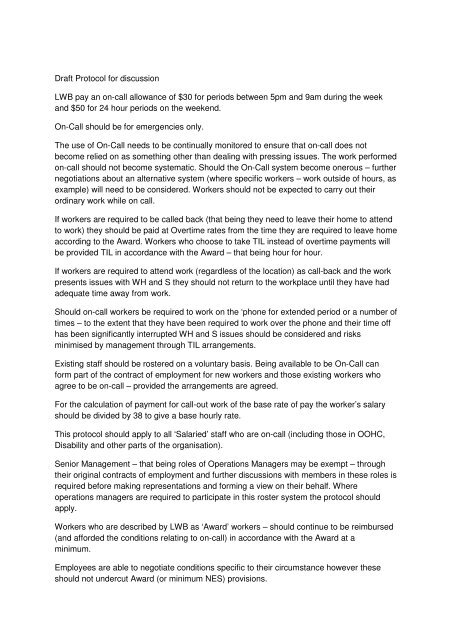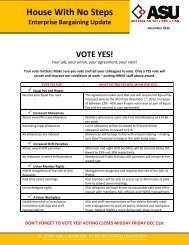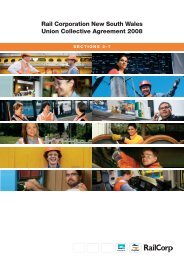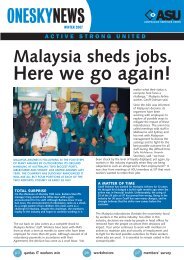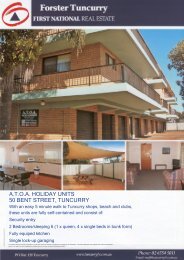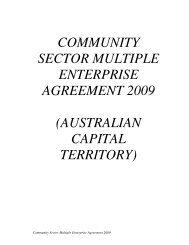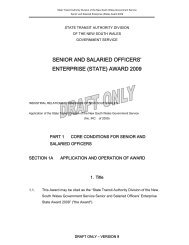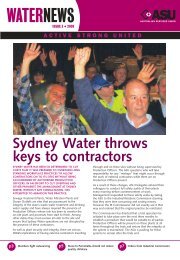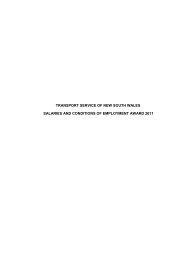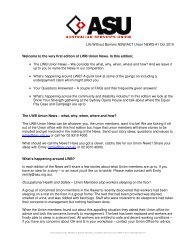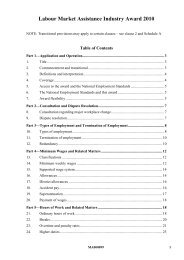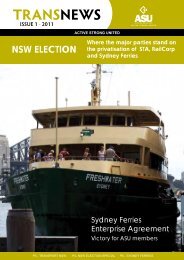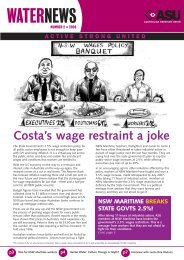On-Call for 'Salaried Staff' Position for discussion and ... - ASU NSW
On-Call for 'Salaried Staff' Position for discussion and ... - ASU NSW
On-Call for 'Salaried Staff' Position for discussion and ... - ASU NSW
- No tags were found...
Create successful ePaper yourself
Turn your PDF publications into a flip-book with our unique Google optimized e-Paper software.
Draft Protocol <strong>for</strong> <strong>discussion</strong>LWB pay an on-call allowance of $30 <strong>for</strong> periods between 5pm <strong>and</strong> 9am during the week<strong>and</strong> $50 <strong>for</strong> 24 hour periods on the weekend.<strong>On</strong>-<strong>Call</strong> should be <strong>for</strong> emergencies only.The use of <strong>On</strong>-<strong>Call</strong> needs to be continually monitored to ensure that on-call does notbecome relied on as something other than dealing with pressing issues. The work per<strong>for</strong>medon-call should not become systematic. Should the <strong>On</strong>-<strong>Call</strong> system become onerous – furthernegotiations about an alternative system (where specific workers – work outside of hours, asexample) will need to be considered. Workers should not be expected to carry out theirordinary work while on call.If workers are required to be called back (that being they need to leave their home to attendto work) they should be paid at Overtime rates from the time they are required to leave homeaccording to the Award. Workers who choose to take TIL instead of overtime payments willbe provided TIL in accordance with the Award – that being hour <strong>for</strong> hour.If workers are required to attend work (regardless of the location) as call-back <strong>and</strong> the workpresents issues with WH <strong>and</strong> S they should not return to the workplace until they have hadadequate time away from work.Should on-call workers be required to work on the ‘phone <strong>for</strong> extended period or a number oftimes – to the extent that they have been required to work over the phone <strong>and</strong> their time offhas been significantly interrupted WH <strong>and</strong> S issues should be considered <strong>and</strong> risksminimised by management through TIL arrangements.Existing staff should be rostered on a voluntary basis. Being available to be <strong>On</strong>-<strong>Call</strong> can<strong>for</strong>m part of the contract of employment <strong>for</strong> new workers <strong>and</strong> those existing workers whoagree to be on-call – provided the arrangements are agreed.For the calculation of payment <strong>for</strong> call-out work of the base rate of pay the worker’s salaryshould be divided by 38 to give a base hourly rate.This protocol should apply to all ‘Salaried’ staff who are on-call (including those in OOHC,Disability <strong>and</strong> other parts of the organisation).Senior Management – that being roles of Operations Managers may be exempt – throughtheir original contracts of employment <strong>and</strong> further <strong>discussion</strong>s with members in these roles isrequired be<strong>for</strong>e making representations <strong>and</strong> <strong>for</strong>ming a view on their behalf. Whereoperations managers are required to participate in this roster system the protocol shouldapply.Workers who are described by LWB as ‘Award’ workers – should continue to be reimbursed(<strong>and</strong> af<strong>for</strong>ded the conditions relating to on-call) in accordance with the Award at aminimum.Employees are able to negotiate conditions specific to their circumstance however theseshould not undercut Award (or minimum NES) provisions.


